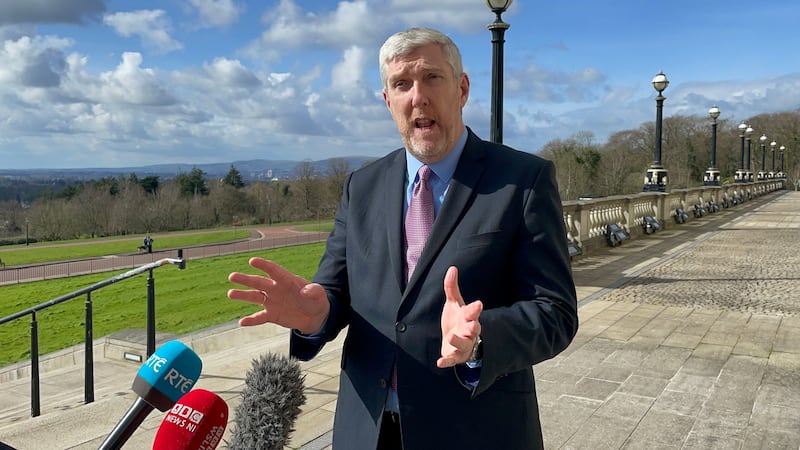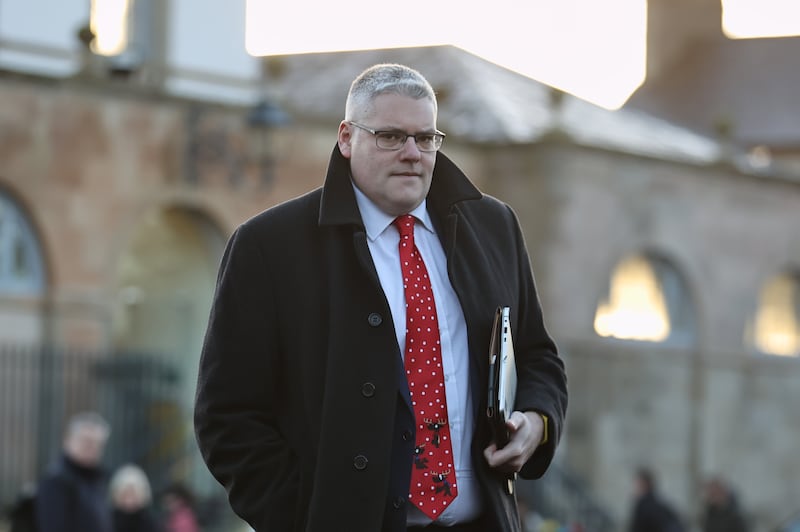Underinvestment in the water system has prevented 19,000 houses being built and Stormont must take action, the Construction Employers Federation has said.
It may have regretted bringing this to public attention. Hours after its claim made headlines, Sinn Féin infrastructure minister John O’Dowd told an assembly debate on funding water that a large share of the cost should be passed on to developers.
Legal powers to do this already exist, although they are scarcely used.
The UUP, which had brought the debate, as well as the SDLP and Alliance, all warned it would just put up house prices.
O’Dowd was unapologetic, saying developers should and often would bear the cost themselves.
In practice, it hardly matters. Even a contribution on the order of £10,000 per house would be lost in the noise of market fluctuations. Houses might cost less if house-building in Northern Ireland was not at a 60-year-low, due in large part to under-investment in the water system.

**
O’Dowd has been in equally rambunctious form over expansion of the Cloughan Point oil terminal in Whitehead.
Local objectors say it is “shocking” the minister has not called in council planning approval for a review, as he can do on ‘regionally significant’ projects. They say the expansion goes against Stormont’s 2050 net zero policy.
O’Dowd’s department replied that he “gave the matter careful consideration”, civil service speak for ‘we threw your letter in the bin’.
Quite right too, although it remains to be seen if this attitude extends to Sinn Féin constituencies. The party’s Nimby record on energy projects is pathetic.
**

Taxi firms in Northern Ireland fear the industry will collapse if 20 per cent VAT is added to fares. Stormont may make it a requirement following court cases in England and Wales.
This story has a link to the Windsor Framework. The government wanted to raise the £90,000 VAT threshold in last month’s budget, which would have kept smaller taxi operators out of the system. But the threshold cannot be lifted here due to EU law, so the chancellor did not raise it in Britain to avoid creating a VAT sea border.
Inflation will drag more small businesses into the onerous system unless the threshold is raised, creating political pressure on both sides of the Irish Sea. This is going to be a problem.
**

The TUV has confirmed it offered a general election pact to the DUP and the UUP last year but was turned down.
The TUV believes this makes the DUP look hypocritical for accusing it of splitting the unionist vote. Certainly, the DUP’s idea of unionist unity is everyone else standing aside. But it was absurd of the TUV, with no seats and no hope of winning a seat, to offer a ‘pact’ to the eight-seat DUP.
More intriguing is the claim, not denied by the DUP, that Gavin Robinson – now party leader – ruled out a pact because he wants the UUP to run in his east Belfast constituency and split the Alliance vote. This shows the DUP knows unionist unity shrinks unionism’s appeal, although it prefers not to point this out to the unionist electorate.
**

Sinn Féin has published a document on tackling sectarianism that appears to give the party’s clearest support yet to integrated education – or any rate, its least equivocal support.
On the same day, in the assembly, SDLP opposition leader Matthew O’Toole was trying to establish what happened to £150 million from the 2015 Fresh Start agreement that had been ring-fenced to build 10 integrated schools.
Sinn Féin finance minister Caoimhe Archibald replied that the government removed the ring fence and put the money in Stormont’s latest £3.3 billion funding package.
That does not stop the executive spending the money on integrated schools, O’Toole noted, so who has decided not to – Archibald or DUP education minister Paul Givan?
Archibald would only repeat that the government had removed the ring-fence, a complaint Givan has also made.
On the plus side, Sinn Féin and the DUP are integrating well.
**

Belfast City Council’s bilingual street sign policy has a serious flaw. Two mixed streets in the north of the city passed the new 15 per cent threshold for support for Irish and English signage – in fact, almost half of respondents were in favour. However, the council has postponed installation indefinitely due to concerns about community relations.
Responses to the council from the residents indicate the 15 per cent threshold robs the policy of legitimacy. A simple majority requirement would have far more chance of being accepted. The council is now slipping towards a de facto majority requirement in mixed areas anyway, without the advantage of making this clear.
**
Every main Stormont party except the DUP supports a ban on gay conversion therapy. Last year, Alliance said it would bring a private member’s bill if a restored executive did not legislate.
This will be affected by the final report of the Cass Review into gender identity health services for under-18s, published this week.
The review has found that accepting a patient’s self-diagnosis and giving them the drugs and surgery they want is unscientific and dangerous. Alliance’s position is that denying people such ‘gender affirming care’ is a form of conversion therapy and must be included in a ban. This issue has been a significant complicating factor in a law that was already very difficult to draft: it is unclear how gay conversion therapy can be banned when it often consists of private conversations with no money changing hands.
Alliance could now drop its transgender position, which would make legislation easier. If it sticks to its guns, legislation is effectively impossible.
**

In a farewell interview, outgoing taoiseach Leo Varadkar responded to last week’s report on the cost of a united Ireland by saying unification “should never be about money”.
Most nationalists and indeed unionists would agree, but the decisive voters in any border poll will be the unaligned, for whom money probably is a key factor – not in a grubby sense of weighing their wallets, but because sober financial discussions will reassure them while flag-waving will only put them off.
Census projections suggest the unaligned will hold the balance of power for the foreseeable future and reassuring them is the only path to anyone’s aspirations, a numerical fluke for which we should all be profoundly grateful.
The decisive voters in any border poll will be the unaligned, for whom money probably is a key factor – not in a grubby sense of weighing their wallets, but because sober financial discussions will reassure them while flag-waving will only put them off




